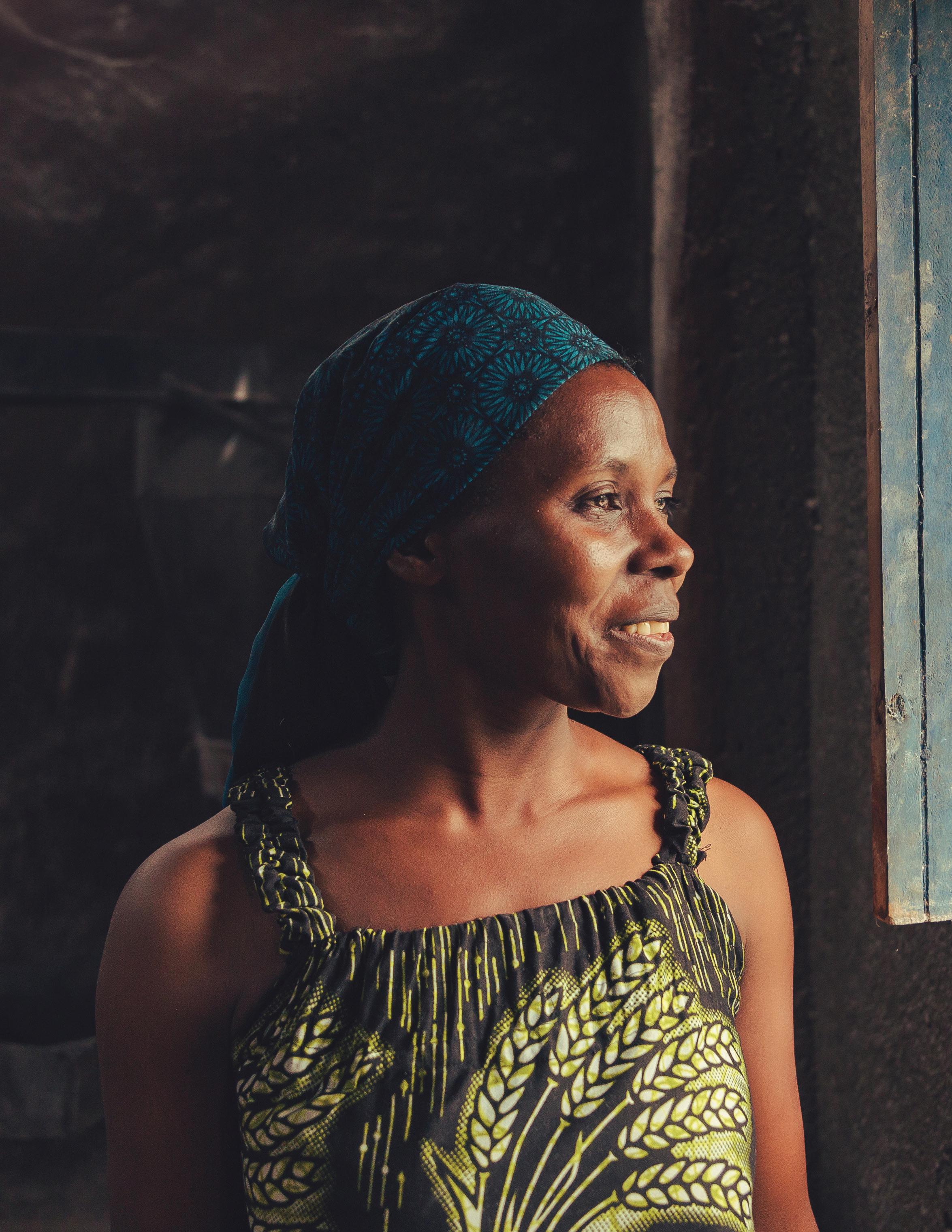
ANNUAL REPORT
2023
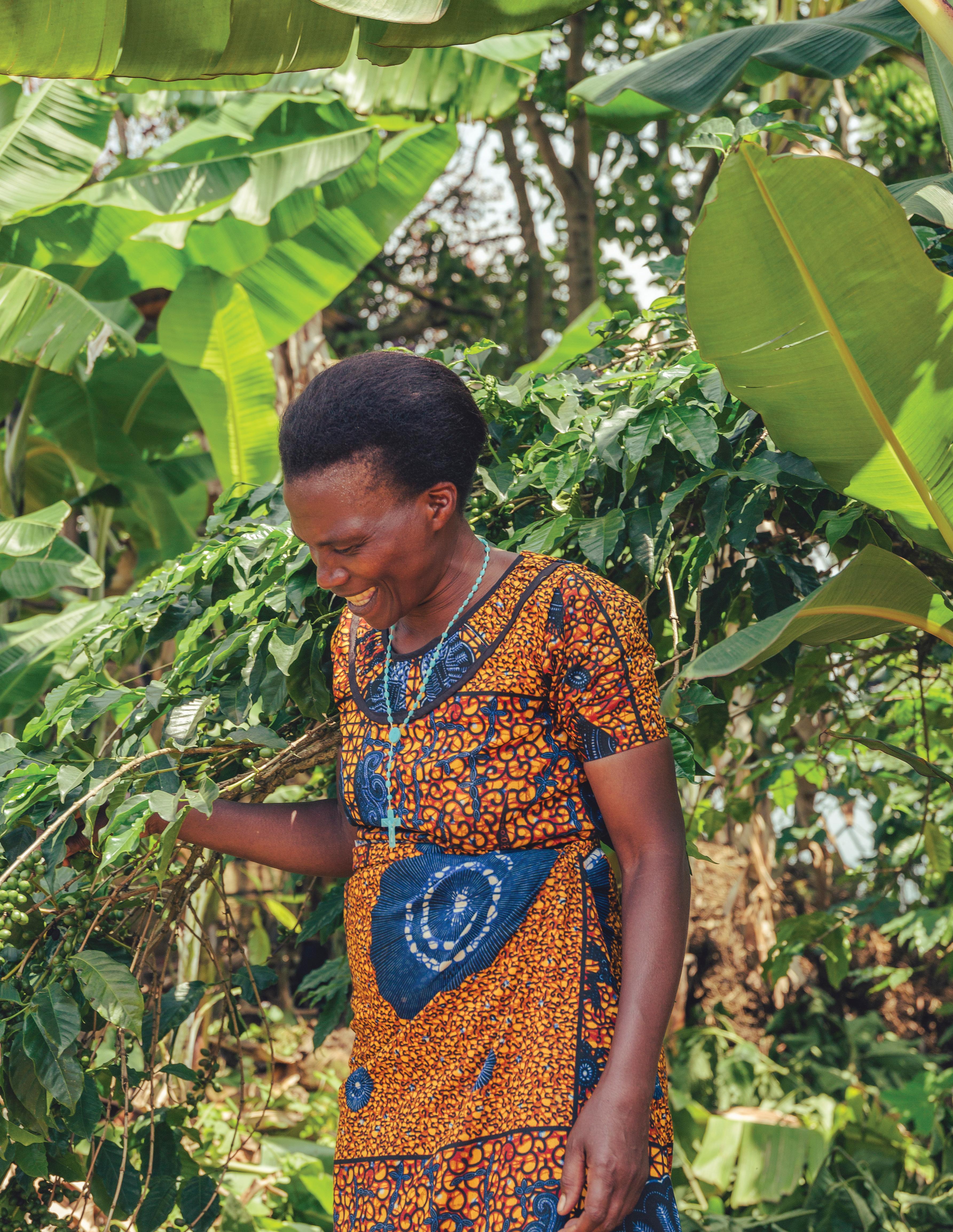
Kula
2 2023 Kula Annual Report
exists to eradicate poverty through the development of entrepreneurs in Rwanda’s coffee communities. Our Mission
When I joined Kula in 2019 as the only woman on Rwanda's management team, my dream was to make Kula's mission visible by empowering women coffee farmers tangibly. In April 2022, I was promoted to oversee Kula Rwanda as Executive Program Director, placing me in a great position to raise a voice and advocate for my fellow women who are in need of training and support to improve their livelihood.
Female coffee farmers face a lot of challenges within the coffee sector. Alongside the problem of poverty is the reality of gender inequity – far too often women are doing the majority of the farming work, yet have little role in making decisions as to how the money is spent, nor the futures of their families. Because of this, through the Kula Fellowship program, we work to support female coffee farmers to see themselves not just as farmers but as business owners, creating an empowering and sustainable increase in income and a vision for their future.
In 2023, we graduated 304 entrepreneurs from the Kula Fellowship program, planted 250,000 coffee and agroforestry trees, provided over 300 livestock for family and farm support, and opened a new community center which has already become a conducive space for farmers in the region to learn and share knowledge in order to improve their livelihood and community. Through strengthened relationships with local and national partners, including the Rwanda Governance Board and a renewed 5-year partnership with Rwanda’s Ministry of Agriculture and Animal Resources, we have big plans for the future – aiming to graduate 7,000 entrepreneurs in the next five years impacting over 17,000 people.
I am so appreciative of the coffee farmers who believe in our work, the entire Kula team who makes our impact seen, and the partners who turn our goals into achievements. The problem is big but our mission is so strong.
As we say in Rwanda – Murakoze cyane.
Thank you so much.
700 million people around the world continue to live in extreme poverty. Most, about two-thirds, are farmers. We are committed to seeing this number dramatically reduced in our lifetime. We’re in good company – thanks to the work of many, this number has been steadily declining – but there is much more to be done. We believe it’s vitally important, we know it’s possible, and we are confident that we provide support that works.
Kula’s story is one of building from the ground up: listening before doing, forming relationships before implementing programs, and constantly improving through learning. When we launched our Fellowship Program in 2018, combining key aspects of our work into one cohesive poverty graduation model, we knew there would be both short and long term indicators of its success, and with each cohort we have modified, adjusted and updated in response.
In 2023 we graduated our fourth cohort, surpassed 1100 total graduates, and conducted our most robust 3 year post-program surveys to date. Each year our program has strengthened, and the results are clear: after 3 years our 2019-2020 cohort has nearly quadrupled their income, while after just one year our 2021-2022 cohort has already tripled theirs.
This improvement has come through consistently evaluating and learning from our work, and we are continuing to do so, tasking ourselves to increase our impact and efficiency even greater, knowing that we have the experience to increasingly focus our time, energy and resources to better achieve new targets, bigger than we would have previously thought possible.
This 2023 report celebrates great successes – for Kula, for our latest cohort, and for each individual Fellow – as well as a resolve to the task ahead. The challenge is big, but we are ever rising to meet it. And together, we can go further.
Thank you.
Jackie Mutesi Executive Program Director
Nic Lauten Executive Director
Letter from Our Executive Director Letter from Our Executive Program Director
2023 Kula Annual Report 3
THE PROBLEM Our Model
In Rwanda, 52% of the population lives in extreme poverty, including the majority of Rwanda’s 450,000 coffee farmers. Female coffee farmers in particular face a disproportionate amount of challenges within the sector. Despite carrying an unequally large burden of responsibilities, they are often excluded from decision-making processes and have less access to finance, environmentally sustainable farm materials, training, and leadership opportunities.
WHY COFFEE?
Consistently one of the top three export cash crops in Rwanda, coffee is grown throughout the country and has the potential to be uniquely impactful in the lives of farmers. While involving a higher barrier of entry than other crops coffee is a long term investment that, when cultivated well, can provide a greater return per land size than most other.
Defined by the World Bank as living on less than $2.15 per person per day
The Kula Fellowship Program: A poverty graduation model joining agricultural support, income diversification and business coaching to elevate female farmers and their families out of extreme poverty. Based on our Theory of Change, Fellow households move out of extreme poverty through training, tools, and agricultural inputs that equip them to increase their coffee harvest, business training and access to capital that support them in launching new and diversified revenue streams, and personal coaching that empowers them through the process.
Where We Work OUR SOLUTION
RWANDA
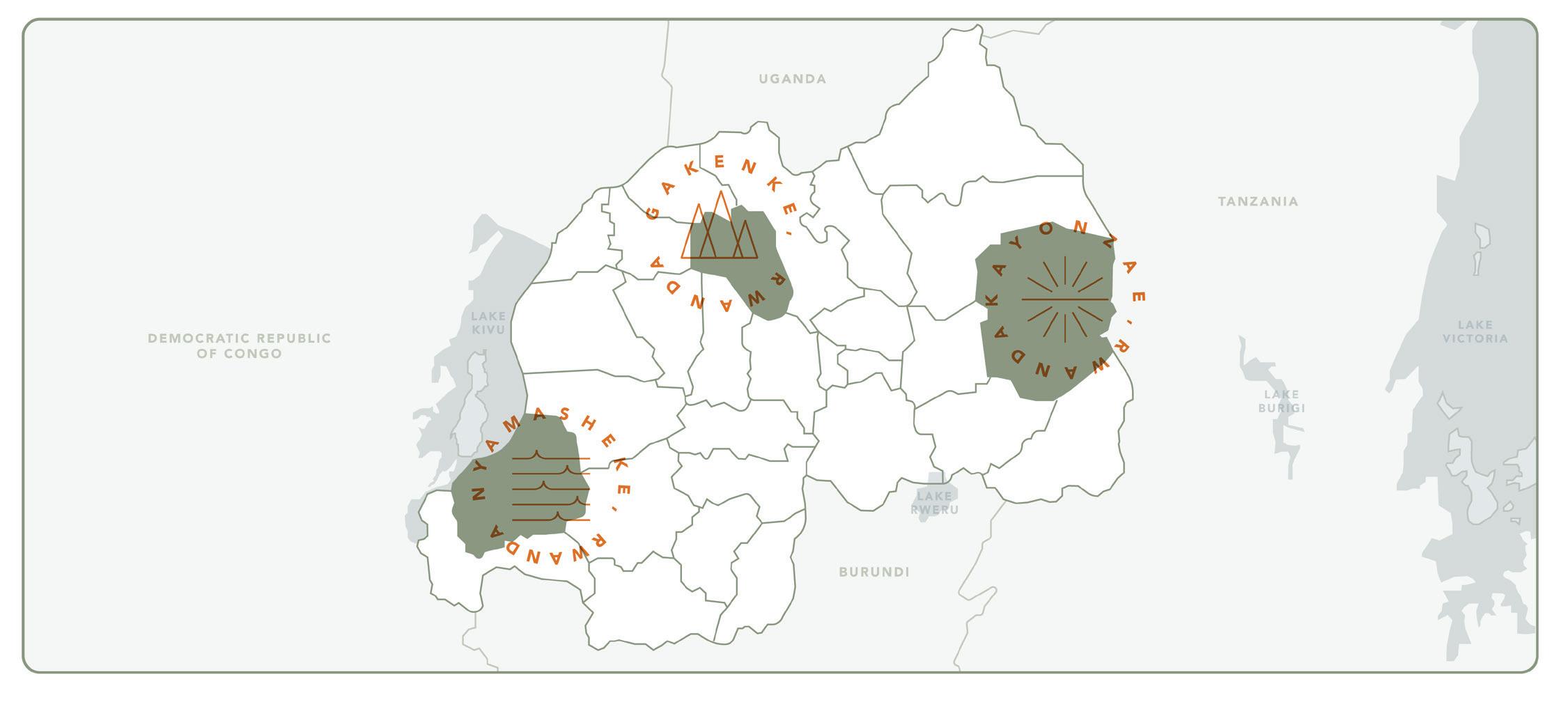
T
EX
REME POVERTY
4 2023 Kula Annual Report
Our Work by the Numbers
1,150
EN TR E PRENEURS GRADUATED
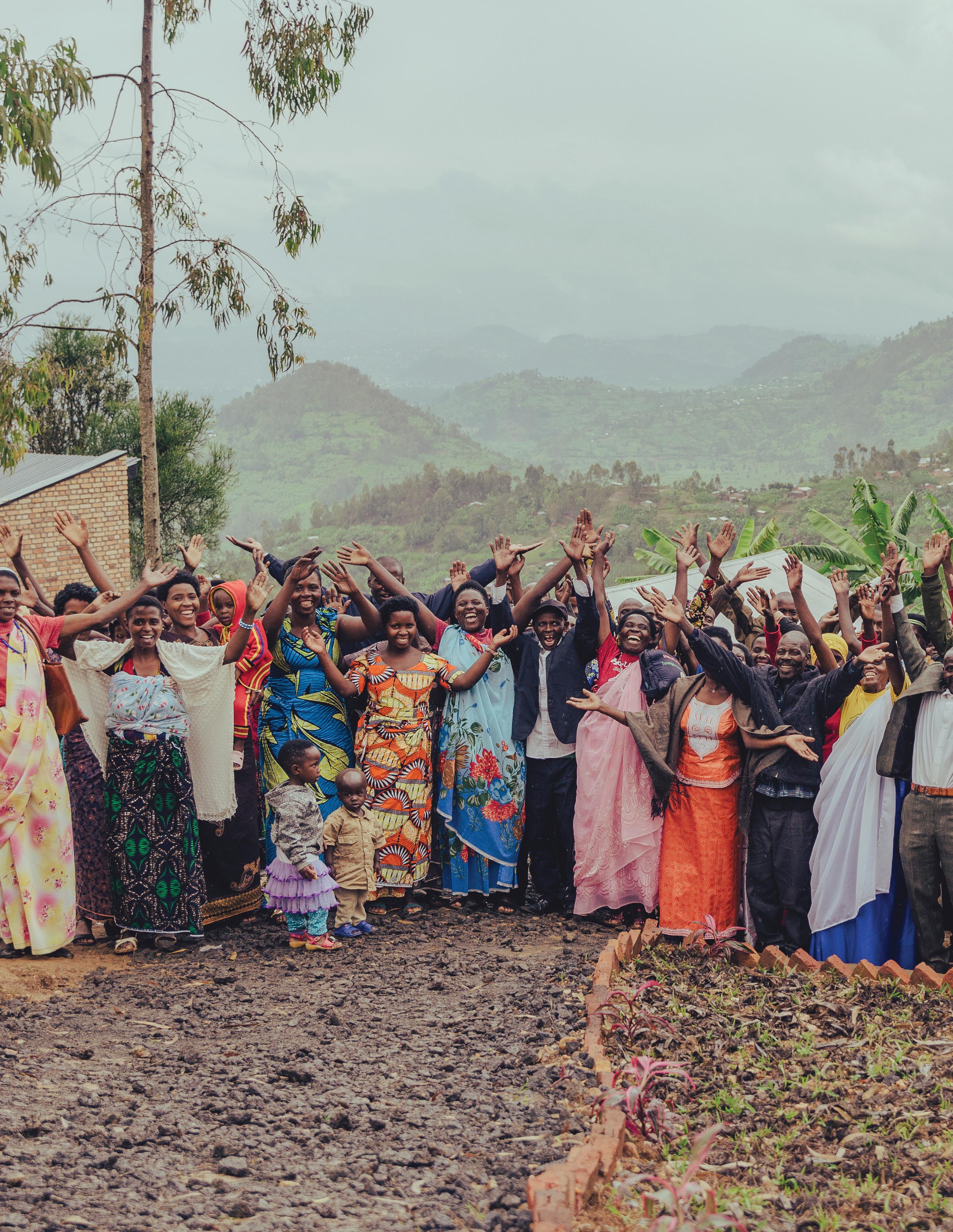
5,025 150+
PEOPLE IMPACTED
850,000
BUSINE SSES INVESTED IN COFFE E & A GROFORESTRY TREES PLANTED
2023 Kula Annual Report 5
Our Programmatic Approach: The Kula Fellowship
The Kula Fellowship is a 12-month poverty graduation model designed to empower and equip farmers and their families to move out of extreme poverty.
Fellow Targeting & Selection
F ELLOW TARGETING & SELECTION
COFFE E FARM TRAINING
BUSI NES S THEORY: TRAINING, DEVELOPMENT & COACHING:
BUSIN ESS PRACTICE: LAUNCHING & COACHING
May/June
In partnership with Rwanda’s Ministry of Agriculture, National Agriculture and Export Board, and District Governments, Kula identifies regional areas in need of poverty alleviation and coffee farming support. Through initial targeting surveys, Kula gathers data for potential Fellows, with final selection based on the set criteria designed to target households with both the greatest need and highest potential for growth through the program.
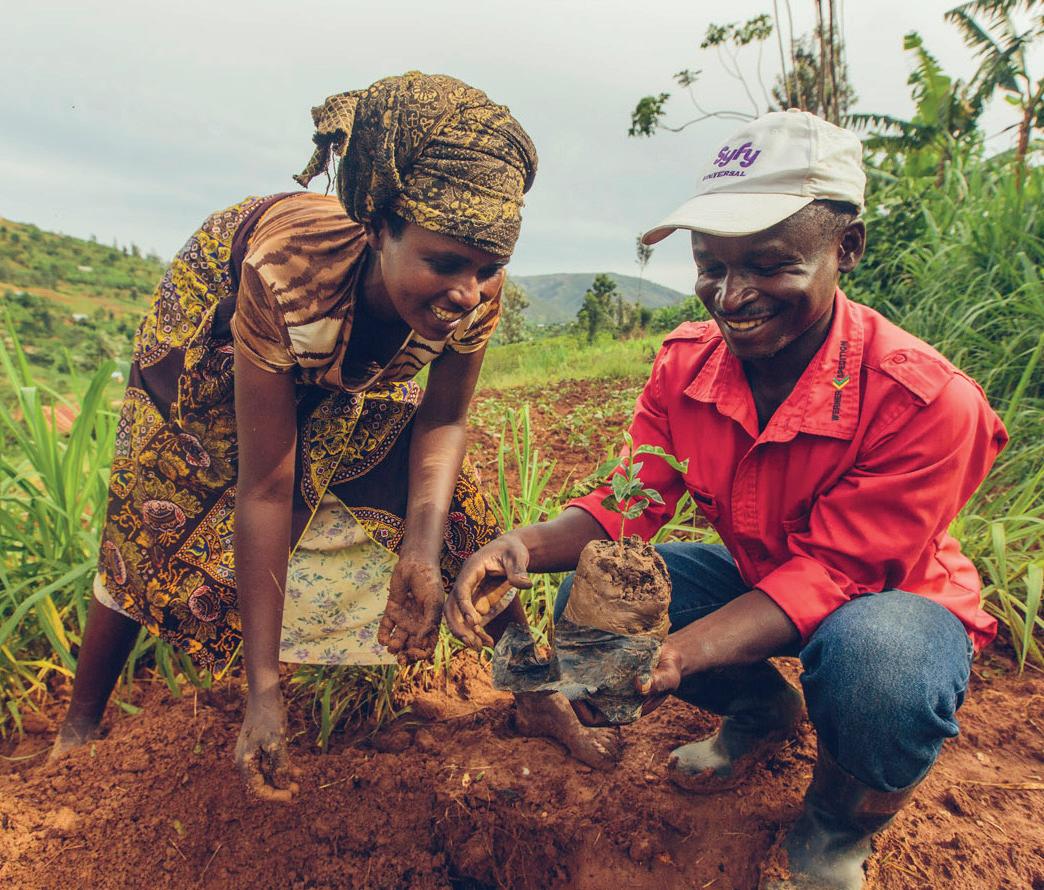
Coffee Farm Training July-June
Throughout the program, Kula provides coffee farm training and strategic farm inputs through a regenerative and sustainable approach, through a mix of group training and one-on-one farm visits conducted by Kula agronomists, taking place in accordance with the seasonal curriculum of best practices. Training and inputs are developed to not only increase production, but also to ensure that the health and longevity of the land is protected, that materials are accessible by farmers beyond the end of the Fellowship, and that climate change impacts are anticipated and mitigated where possible.
MAY JULY SEP NOV
MAR
JUNE AUG OCT DEC
APR JUNE
JAN
MAY
FEB
6 2023 Kula Annual Report
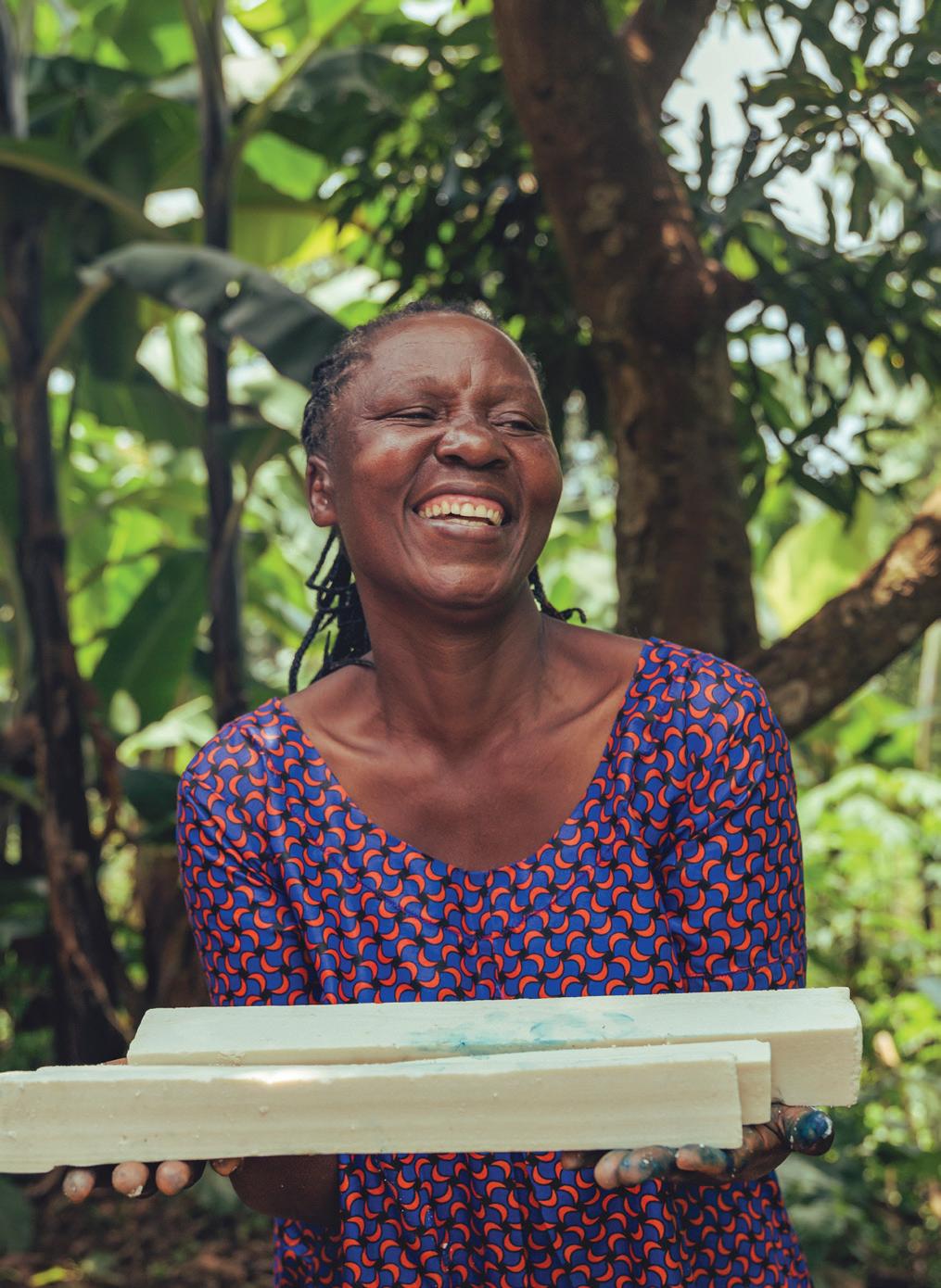
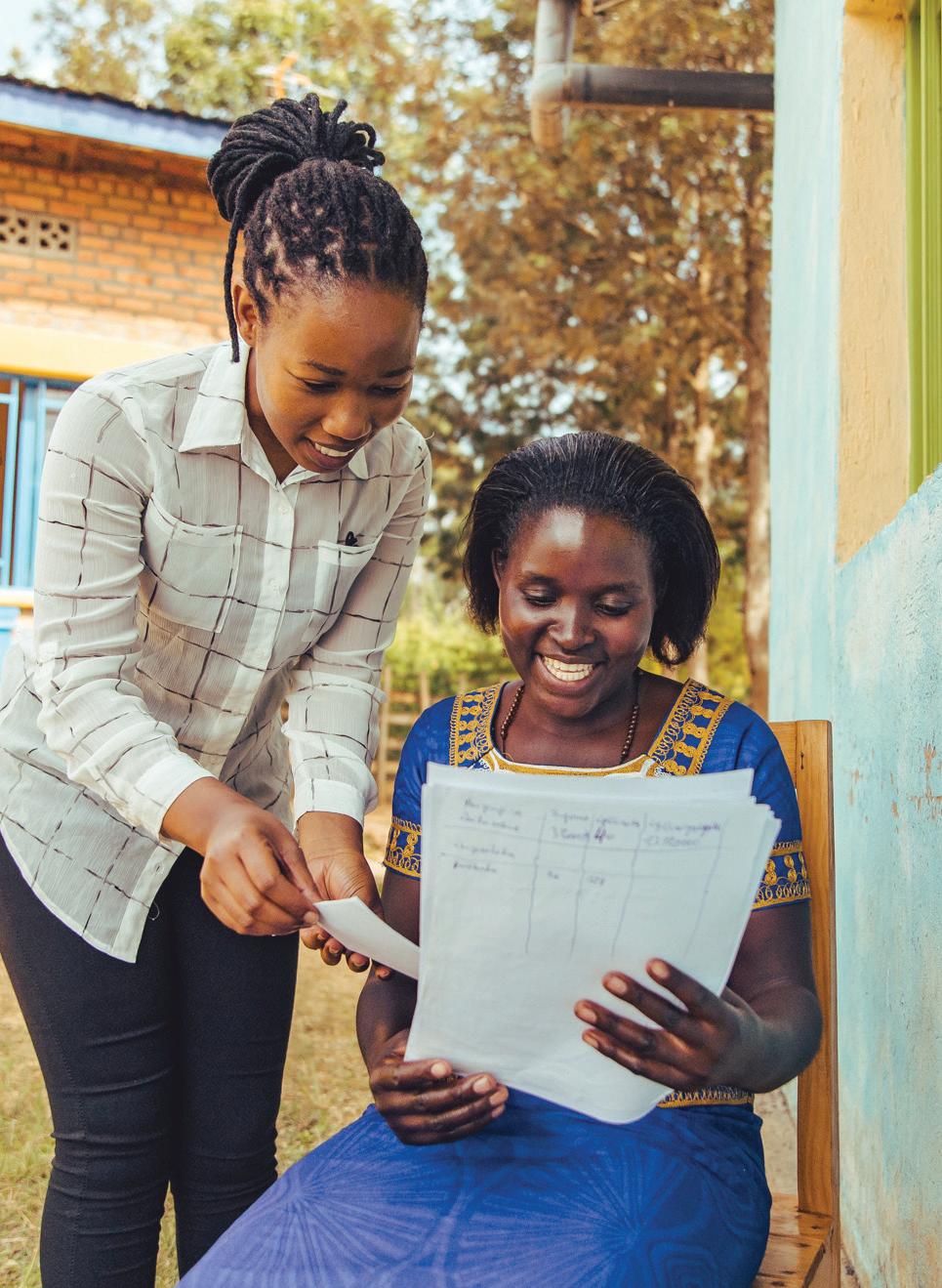
Business Theory Training, Development & Coaching
Kula provides business training to support Fellows in launching new ventures and diversifying their income streams. Alongside Coffee Farm Training, Kula Business Coaches conduct group and individual training with the first six months of the Fellowship focused on Business Theory aiming to build clarity for Fellows’ self-awareness, goals, and vision, equip them with tools to develop and launch new businesses, and form Village Savings and Loan Associations (VSLAs) in order to build their savings and grow a pool for future finance capital. Upon conclusion of Business Theory Training, Business Plan Competitions are held to strengthen the process and award standout ideas and pitches. July-December
In the second half of the Fellowship, Fellows access finance and launch their businesses. While some are awarded grants through the Business Plan Competition, all Fellows have access to seed capital via the VSLAs facilitated and invested in throughout the Fellowship. Kula Coaches continue supporting them through regular personal coaching sessions and group training on topics needing review or which arise through specific business challenges. Fellows are also connected with established businesses in their industry for advice and feedback. Business
2023 Kula Annual Report 7
Practice: Launching & Coaching January-June
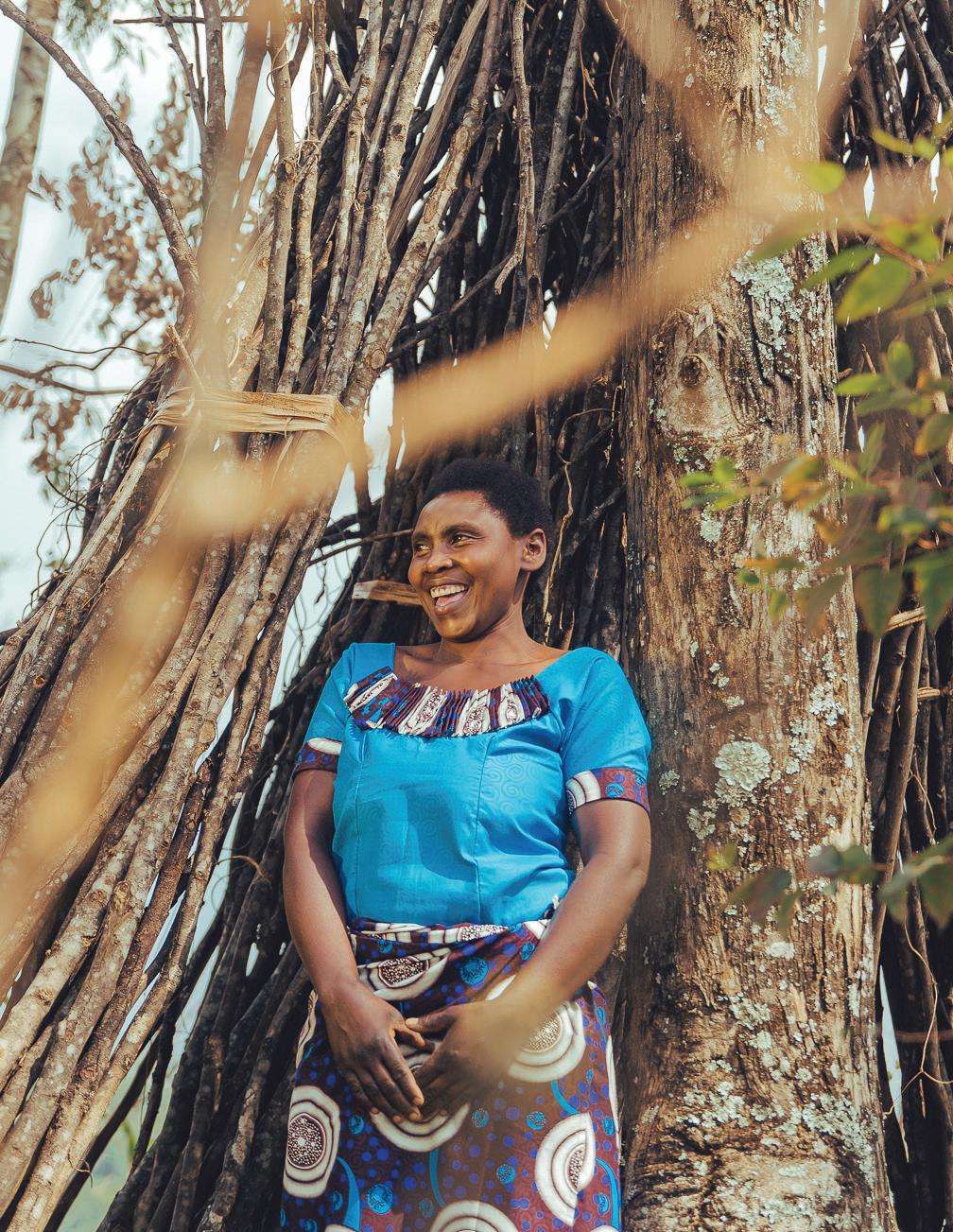
8 2023 Kula Annual Report
Our Program Pillars
Kula’s Program Pillars serve as the lens and values through which we engage in our work. These pillars guide not just what we do but how we do it: where emphasis is placed in training, what kinds of farm materials and methodologies are provided, what kinds of businesses are supported, and how we make decisions. While keeping our focus on organizational purpose and ends, these pillars ensure that the means are never sacrificed.
Women’s Empowerment
Equitable Entrepreneurship
Our Women’s Empowerment pillar is based on the proven belief that when women, who have been historically and systematically disempowered, have the opportunity to earn income and access finance, the chance to gain strategic knowledge and skills, and the right to make decisions for themselves and their families, more equitable and sustainable livelihood improvements develop as a result.
We believe that entrepreneurship is a vital aspect of overcoming rural poverty, and we believe that entrepreneurship should be pursuable for all people. Regardless of gender, race, class or status, each individual should feel and be recognized as capable of starting their own endeavor if they choose. Our work is oriented to ensure that marginalized people- namely, women and those in extreme poverty- are provided the support and opportunity to engage in crafting and fulfilling their vision for the future.
Locally Led Solutions
At the heart of everything we do is the belief and practice that the people and communities affected by “the problems” should be extensively involved in the process of developing and leading “the solutions” that will ultimately solve them. This ensures both the success and sustainability of program outcomes, clarifies areas of program focus, and shifts the power to a proximate perspective that honors our beneficiaries and their families with respect to their lives, their experience, and the cultural context that they live in.
Environmental Sustainability
While working to support rural farmers out of poverty, we examine all training methods or farming materials provided through a lens of their environmental impact. In light of changing climates, we welcome a responsibility to be forward thinking in how we approach agricultural support; valuing long term land health over short term productivity spikes, and investing in full ecosystem vitality amidst our focus on coffee growth.
Regenerative Impact
Evidence Based Actions
We strive to create impact that is not dependent on our inputs year over year. When crafting our Fellowship we have focused on training that equips Fellows for the long term, and materials that are not reliant on ongoing external infusion. This can mean training Fellows in composting rather than providing expensive and inaccessible fertilizers, or investing deeply into VSLAs as a community-monitored rotating pool of business seed capital. The goal is to provide new knowledge and support, while steering away from one-time inputs that have little recurring impact.
Through our commitment to monitoring the outcomes of work and evaluating its impact through detailed analysis, we use short-, medium-, and long-term data to inform and influence program evolution and improvement, aiming to continuously increase the efficacy and efficiency of our program in order to empower more households to sustainably move out of extreme poverty.
2023 Kula Annual Report 9
Mon itoring, Evaluation, Accountability, and Learning
Kula’s MEAL Plan
Kula is committed to monitoring and measuring the outcomes of our work, evaluating our impact in the lives of our Fellows and their families, taking accountability for the effects of our programs while ensuring the proper allocation of resources and support, and continuously using what we learn to make evidence-based decisions to improve the quality and effectiveness of our program.
We partner with Standard Co., a data management solutions company dedicated to solving real-world data management problems, to collect quantitative and qualitative data throughout the program cycle and after graduation, and to develop comprehensive dashboards that allow Kula staff and partners to evaluate inter-program progress and post-program results.
Kula takes a multilevel approach to monitoring the activities, progress, and outcomes of our work in the short-, medium-, and long-term in order to measure and evaluate the impact of the Kula Fellowship.
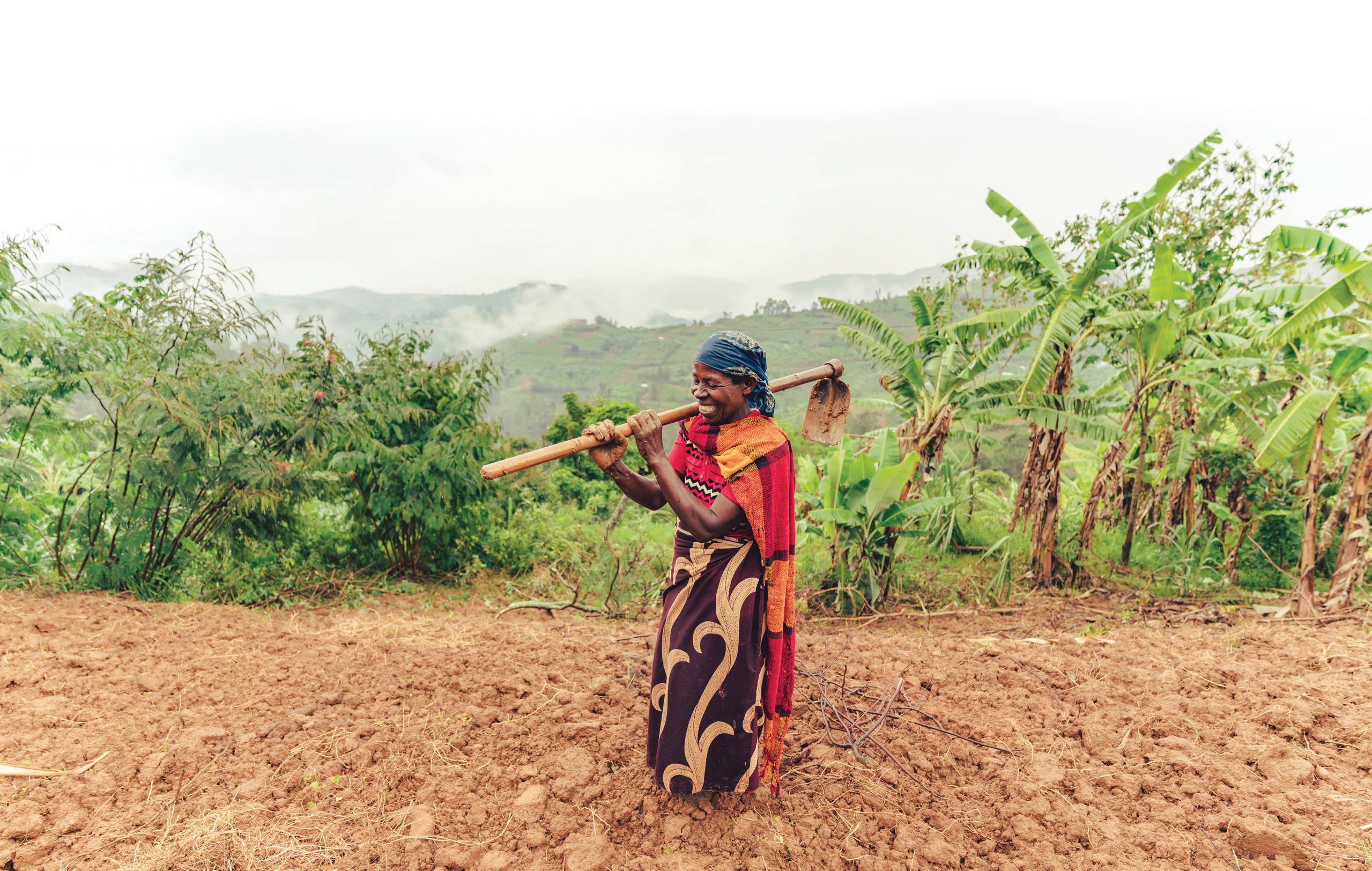
10 2023 Kula Annual Report
For short- and medium-term, inter-program monitoring, Kula Staff routinely track program implementation, participation, and progress in an effort to provide real time data and create internal feedback loops that indicate whether or not program activities and participants are on track with program goals. Kula Staff then use this information to either move forward or allocate additional time, attention, and resources to households or program areas that need improvement. For long-term impact measurement, Kula uses baseline and exit household surveys to assess overall program impact and changes in graduates’ standards of living up to 5 years after entering the program. While we measure program impact across various indicators, Kula’s Key Impact Metrics include increase in household income, increase in coffee harvest, and revenue generated through new income-earning activities.
After monitoring, measuring, and collecting data, our team begins the evaluation process. In line with our multilevel monitoring approach, our evaluation processes seek to analyze these various levels of datasets to promote inter-program and post-program improvements as well as increased understanding of program outcomes and impact. Results from this analysis then inform amendments and improvements to the Kula Fellowship to more effectively support individuals and households toward sustainable income generation and livelihood improvements.
Once the evaluation process is complete, Kula disseminates evaluation results and impact reports to partners including funding partners, government partners, field partners, our community of supporters, program fellows and graduate households. Through our commitment to transparency, integrity, and humility, we consistently report the results of our monitoring process in regards to our long-term post-program impact, as well as associated financial expenditure, in an effort to take accountability for both our success and lessons learned throughout the program cycle. We believe it’s just as important to be accountable to the people impacted by our program as those who fund and support it, ensuring that both in-program progress as well as the overall impact of our work is shared with program participants, and that their feedback is sought throughout the process.
At Kula, we believe that the primary purpose of measuring and evaluating the impact of our work is to learn how to make our programs more effective, more efficient, and more impactful for future beneficiaries. We are dedicated to not only sharing the results of our work, but to using those results to inform future amendments and make evidencebased improvements to the Fellowship program in order to better support individuals and households out of extreme poverty. Our learning process is continuous, as our staff make data-driven decisions and refinements throughout the program cycle as well as a more formal and focused evaluation and learning process annually at the end of a program cycle, before a new Fellowship cohort is onboarded.
BASELIN E DATA COLLECTION EXIT DATA COLLECTION & EVALUATION LONG-T ERM DATA COLLECTION, EVALUATION, & LEARNING 12 MONTH PROGRAM 4 YEARS POST PROGRAM EXIT CONTIN U ING TO CONDUCT DATA COLLECTION ANNUALLY INTER-PROGRAM DATA COLLECTION & EVALUATION MEAL Plan Timeline 2023 Kula Annual Report 11
Monitoring Evaluation Learning Accountability
Our Impact
Results By Cohort
With each Fellowship Cohort, Kula continues to see higher levels of impact year-over-year with program results maintaining steady and sustained growth after graduation due to the strengthening of our methodology and team, greater clarity on the most effective strategies and inputs, and increased investment into program components responsible for the highest levels of impact. Rooted in our organizational approach of continuous improvement and evidence-based action, we continue to learn from our impact data and utilize it to drive program developments, always aiming to increase the efficacy and efficiency of our work.
Key Impact Metric: Increase in Income
HOUSEHOLD
DAY
AVERAGE
INCOME PER
AVERAGE HOUSEHOLD INCOME PER DAY FELLOWSHIP COHORT: 2 019-2020 2021-2022 2022-2023 FELLOWSHIP COHORT INCOME 1 YEAR POSTGRADUATION: $3.04 $4.27 2 YEARS POSTGRADUATION: $3.55 3 YEARS POSTGRADUATION: $4.61 BASELINE: $1.20 $1.24 $1.45 BASELINE 0 $1 $2 $3 $4 $5 GRADUATION 1 YEAR POSTGRADUATION 2 YEARS POSTGRADUATION 3 YEARS POSTGRADUATION GRADUATION: $2.24 $2.39 $3.20 $3.20 $4.27 $4.61 12 2023 Kula Annual Report
Based on these exciting results from focused allocations in previous Cohorts, we are increasing seed capital as a program priority, ensuring that all Fellows will have access to finance beginning with the 2024-2025 Cohort. All
KEY: AVERAGE DAILY HOUSEHOLD INCOME FOR SEED CAPITAL RECIPIENTS VS TOTAL COHORT Average Annual Coffee Harvest per household Average Increase in Monthly Savings per household $4.61 $4.27 $6.99 $6.48 Total Cohort: Total Cohort: Seed Capital Recipients: Seed Capital Recipients:
monetary results in USD calculated using the World Bank’s most recent Purchasing Power Parity exchange rate for Rwanda (52% higher than total cohort) (52% higher than total cohort) 3 YEARS POST GRADUATION: 1 YEAR POST GRADUATION: 2021-2022 COHORT: 2019-2020 COHORT: 1 YEAR POSTGRADUATION 2 YEARS POSTGRADUATION 3 YEARS POSTGRADUATION GRADUATION BASELINE FELLOWSHIP COHORT PERCENTAGE INCREASE 20192020 20212022 20222023 100% 200% 300% 400% 500% 600% FELLOWSHIP COHORT COFFEE HARVEST (KG) 20192020 20212022 20222023 100 200 300 400 500 600 KG KG KG KG KG KG 562 KG 556% 395% 292% 357 KG 292 KG 2023 Kula Annual Report 13
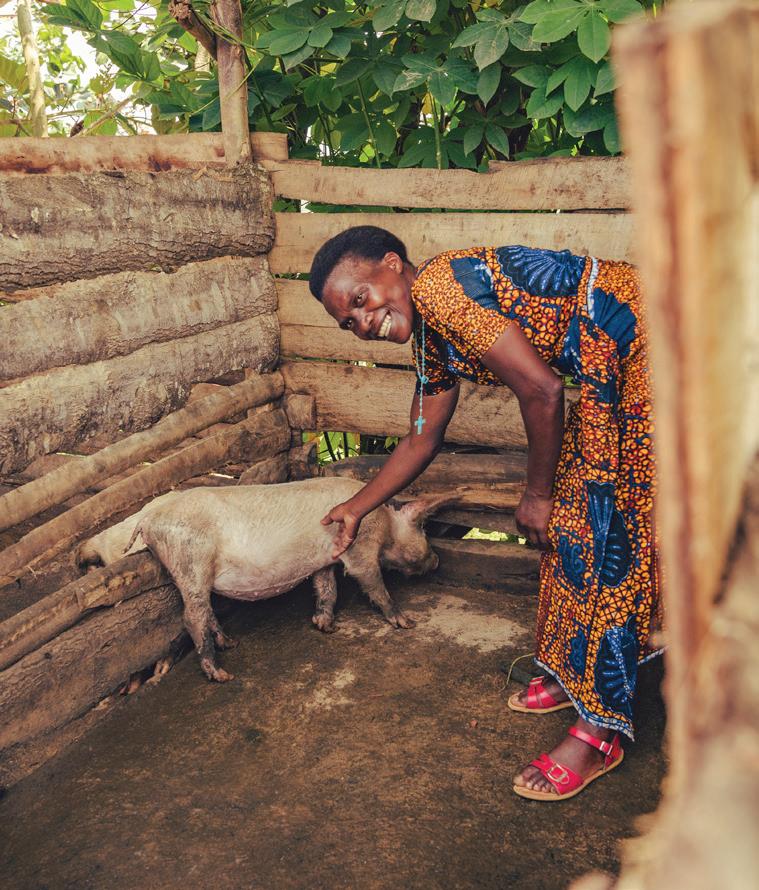
DROCELLE
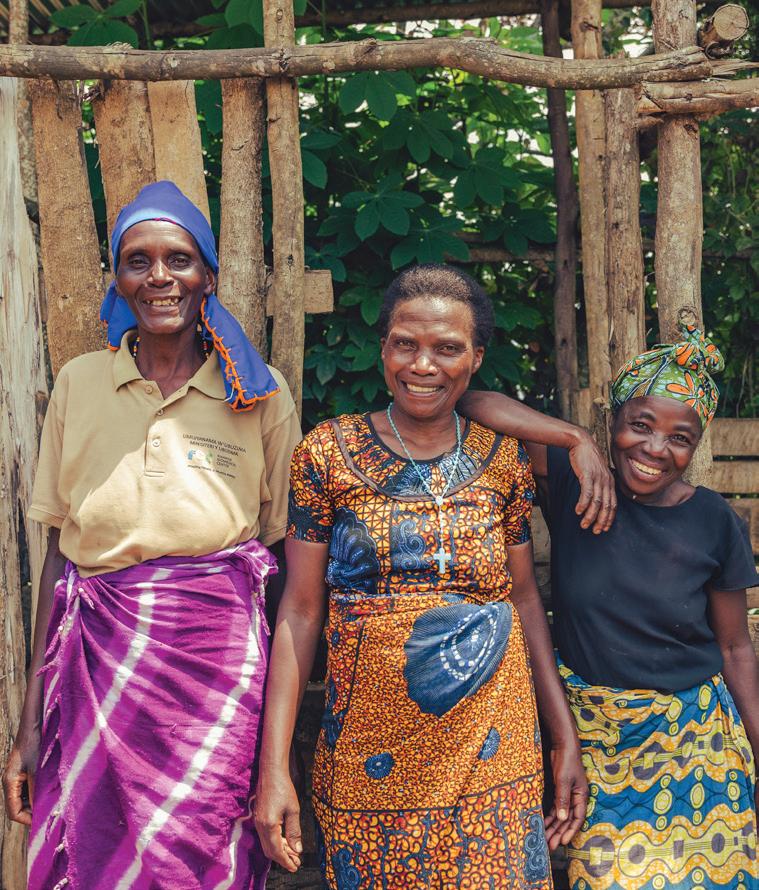
Drocelle has increased her income by 2300%.
When Drocelle first joined our program, she recounts feeling lonely and hopeless. After losing her beloved husband a few years prior, she felt as if she “had lost all of her dreams”. As a single mother of three children, she was working hard but earning very little through the small harvest her coffee farm was yielding, but more than anything, she felt unable to see a future worth hoping for.
Although she entered the program shy and unsure of what would come of the process, Drocelle soon realized the benefit of meeting with other farmers in her region to learn concepts that would enable her to not only improve her farm and grow her income, but also to build relationships she could lean on. One of the first trainings she attended focused on the concept of self-esteem – aimed at teaching Fellows the power of believing in themselves and their capability as well as growing their level of confidence and decision-making capacity. It was this training that Drocelle says “revived her hope” and made her start to believe that “life is still possible”.
Drocelle counts that as a turning point in her life. From there, she began growing within the program as a person, a coffee farmer, a community member, and an entrepreneur. Toward the end of the Fellowship, she was inspired by the business training she’d received to develop a plan to diversify her income. She began to work with her Business Coach to draft a plan for a sustainable microenterprise focused on pig-rearing, presented the plan, and ultimately received seed capital to get it started.
Since then, she has turned her investment into a thriving business – rearing pigs to sell in the local market while simultaneously creating a source of organic fertilizer to sell and utilize in order to increase the quality and quantity of her coffee harvest. Through improved technique and farm inputs, she has increased her coffee harvest, generating 190% more yield from the same number of coffee trees. With increased production, as well as focused effort to diversify her income through her new business, Drocelle has increased her income by 2300%.
During the Fellowship, Drocelle set a household vision focused on three goals: renovating her home, purchasing another plot of land, and supporting each of her children through secondary school. Through her growing income and increased self-belief, she has been able to achieve every single one, with her last child scheduled to graduate in the coming months.
Perhaps, most importantly, through her time with Kula, Drocelle told us that she found “a community that makes her feel less alone”, allowing her to move forward with support and hope for what’s to come.
2022 Fell owship Graduate – One Year Later
14 2023 Kula Annual Report
ESPERANCE & FELICIEN
2023 Fellowship Graduates

Esperance and her husband Felcien first heard of the Kula Fellowship in 2021 when Kula expanded programming into their sector in Nyamasheke.
Before joining the program, Esperance and Felicien were cultivating their coffee trees using untrained techniques, leading to a very under-producing coffee farm. With the money they earned from farming, they weren’t able to manage their finances well, spending their income unwisely and never knowing how to plan or save for the future.
After a few months of participating in the program, Esperance and Felicien began to feel “this [was] the start of a new life”. Through the financial literacy training they received, they developed a new financial system for their household, meeting regularly as a family to discuss financial decisions and outlook as well as establishing a strong practice of record keeping and budgeting for income and expenses. They also opened up a bank account and received their very first loan. Through their agronomy training, Esperance and Felicien were able to increase their coffee harvest by 240%, and by graduation had increased their income by 133% and monthly savings by 3900%, allowing them to begin building a new home for their growing family, increase their food security, and lay the groundwork for their new business.
“This is the start of a new life.”
When working together to determine a concept for a new business, Esperance drew upon hardship she endured in the past. After experiencing difficult complications during the birth of their triplets, Esperance was instructed by her doctor to consume tree tomatoes as a way to increase red blood cells and her antioxidant, vitamin C, and iron levels. From this challenge, she and Felicien chose to see opportunity –crafting a plan for a tree tomato business to support not only Esperance’s needs and other women in the community facing similar challenges, but also their community at large through agribusiness. This story and the strength of their vision made them a winner in Kula’s Business Plan Competition, and since then they have embarked on cultivating 1,000 tree tomato plants in the coming year, moving themselves and their children steadily into their vision for the future.
2023 Kula Annual Report 15
2023 Year in Review
Kula Fellowship 2023 Graduation Rusasa Community Center Opening
In November we graduated our 2023 Fellowship Cohort, with 304 Fellows completing the Fellowship well equipped into their journey out of poverty, already earning 120% more income than they were before the program. Preceding graduations, we hosted Kula Business Plan Competitions in each region, with 272 plans written, 60 shortlisted, and 36 selected to receive seed capital to start their new businesses after graduation day. Each graduation was a day filled with celebration, a great sense of achievement, and unbridled hope for what’s to come.
Overall Graduation Numbers
304 Fellows Graduated
97% Graduation Rate
1,329 People Impacted
36 Businesses Invested In
Program Exit Impact Data - Key Metrics
120% Increase in Income
205% Increase in Monthly Savings
47% Increase in Coffee Harvest
33% of Graduates Have Already Launched a New Business
This year, we officially opened the Rusasa Community Center! This beautifully designed space will serve as Kula’s primary training facility and resources center for Fellows and graduates of the Fellowship program in Rusasa, providing a space to conduct training and capacity building in coffee farming and business development throughout each program cycle. The Center will also function as Kula’s regional office in Rwanda’s Northern Province. Additionally, as the most modern facility in the remote and rural sector of Rusasa, this building will also serve as a secure and accommodating meeting space for local social and government functions, encouraging the ongoing improvement of infrastructure in a region of Rwanda that has historically received very little investment. Through this center, hundreds, and eventually thousands of farmers will have access to transformative training, resources, and development.
A huge thank you to all our partners involved in turning the Rusasa Community Center from a dream to a reality:
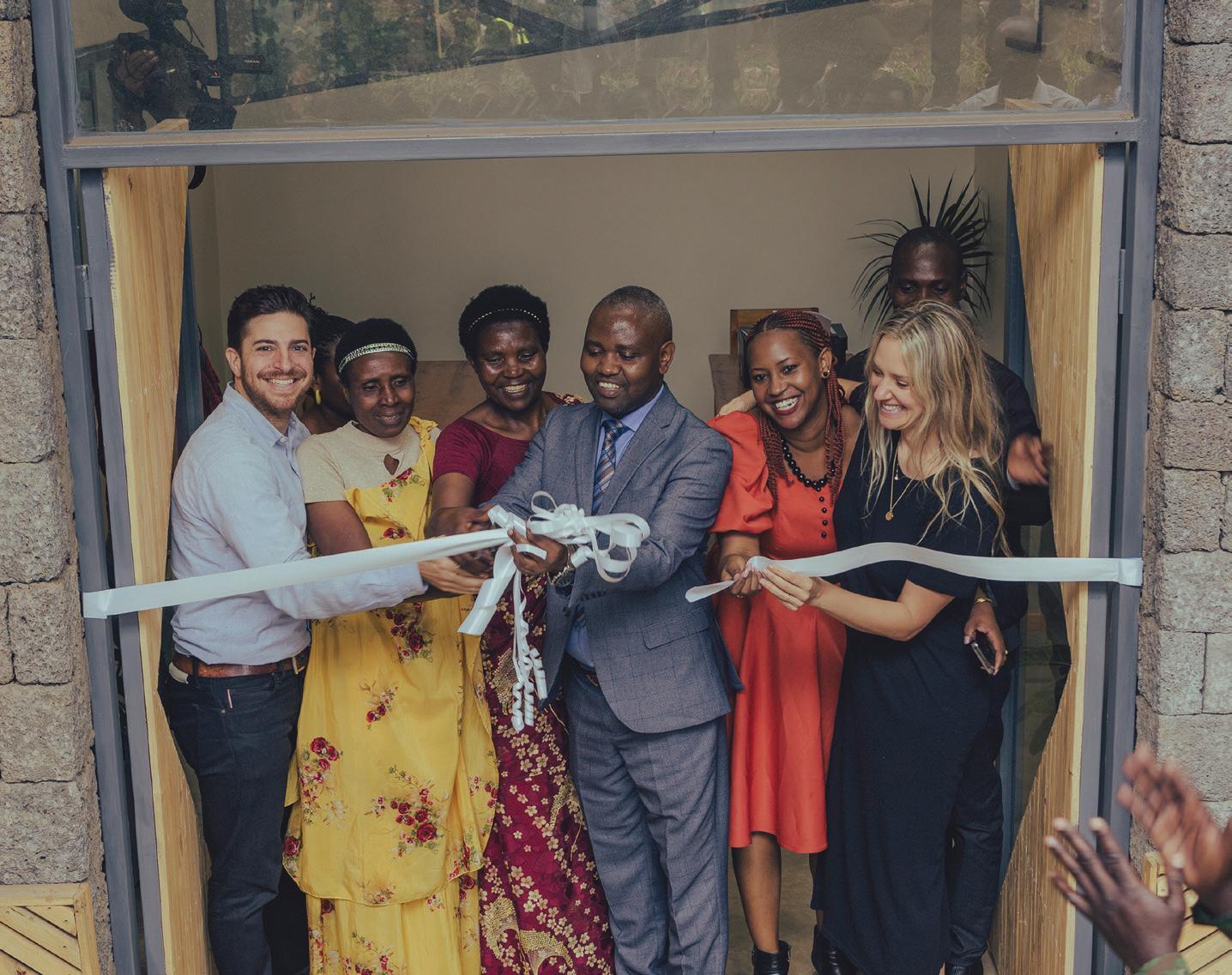
Funding Partners: Berkadia, RELiON Battery, and Kregel & Company
Building Partners: BE Designs and Rwanda Village Enterprises, LTD
16 2023 Kula Annual Report
As a part of our organizational commitment to both environmental sustainability and women’s empowerment, and in recognition of the connection between the two, we hosted the second annual Of Land & Women campaign to highlight the interconnectedness of female farmers and their land, as well as the challenges and opportunities for them both. Thanks to incredible friends and partners, we distributed 250,000 coffee and agroforestry trees in three different regions of Rwanda. Through planting coffee trees intercropped with agroforestry trees, farmers are able to increase the sustainability, health, and resilience of their coffee farms, empowering them to earn additional income and create thriving, lasting coffee businesses. Upon maturation, these coffee trees will provide sustainable income for up to 30 years.
In our fourth year of operations at Ntango Washing Station, we processed 186,866 kgs of coffee cherries, provided over $87,000 in payments and bonuses to 864 farmers, and sold green and roasted coffee to customers in Rwanda, Australia, Poland and the US. We are proud to continue providing a consistent and trustworthy market for farmers in Nyamasheke, and, when paired with our Fellowship Program, a unique full coffee supply chain support model.
Coffee Partners
Peach Coffee Roasters, Prevail Coffee Roasters, Makeworth Coffee Roasters, Third Wave Coffee, Sacred Mill Coffee Roasters, Slide Coffee Roasters, Kula Coffee Co, Kwizera Coffee, Indabo Cafe, Plantable, Atlanta Tech Village
 Ntango Washing Station Update
Ntango Washing Station Update
Of Land & Women Initiative
2023 Kula Annual Report 17
Our Financials
2023 Total Revenue -
$932,790
2023 Expenses - $904,170
Our Partners
We are beyond grateful for all of our partners - an ever growing and diversifying group that makes our impact possible. These committed individuals and organizations are based across six countries and four continents, strengthening our financial sustainability as we continue to grow our work.
Foundation Partners :
Woven Foundation
Nadia & Alf Taylor Foundation
Roberts Pike Foundation
MIGMIR FUND
Segal Family Foundation
Journey Charitable Foundation
1% for the Planet Partners:
One Tree Planted
MiiR
Planet Women
Overview Coffee
Something Familiar
Swelter Coffee
Milkshed Coffee
Corporate Partners:
Berkadia
See Beautiful
Fuller Wealth Managment Firm
Kregel & Company CPA
CANAL + Rwanda
Slide Coffee
Good Today
18 2023 Kula Annual Report
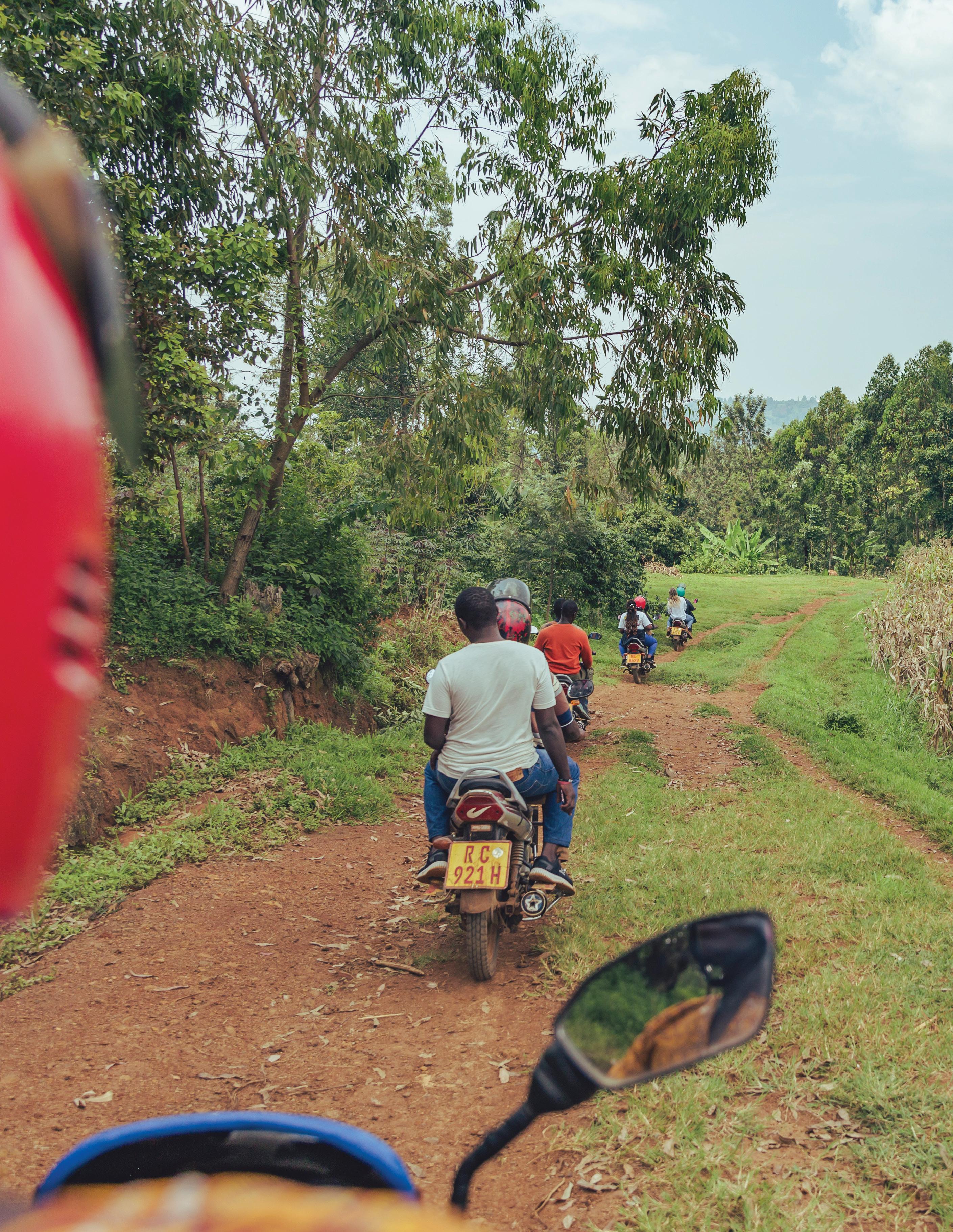
2023 Kula Annual Report 19
Growing our Impact, Increasing our Efficiency
From 2018-2023, we have graduated 1,150 Fellows from the Kula Fellowship, impacting 5,025 individuals. In the most recent 1 year post-graduation data, Fellows have on average increased their income 244%, savings 395%, and coffee harvest 116%. For Fellows receiving business seed capital, their income has increased 423%.
We’re excited by this impact, and we’re driven for more.
We are committed to being an impact-driven organization. To this point in the Fellowship’s evolution we have largely taken a holistic approach, with a fairly large number of impact goals and many different types of inputs and activities to match. While the results have been encouraging, we see the biggest growth opportunities, in both depth and breadth of impact, in our ability to focus on the things we do best, and those which can create the greatest impact for the largest number of people. Poverty is complex and multifaceted, but at the heart of it is a lack of opportunity and access to income and assets, and the resources and freedom that
come along with it. We are working to address that, and believe that the more clearly we can focus on the key challenge the more everything else will be affected.
As we’ve strengthened our MEAL plan and received increasing amounts of long-term impact data, we’ve placed it at the center of our strategic planning process. In clarifying our target definitions and goals we have provided heightened direction for input selection and strategy, and have been able to identify the core components of our Fellowship which are most directly correlated with our desired impact.
By further investing in the areas we’ve seen have the most success – new seedlings, soil amendments and fertilizer for coffee farms, and financial access and focused business coaching for income diversification –we’re confident in reaching exponential results moving forward, ultimately seeing more Fellows move above the extreme poverty line.
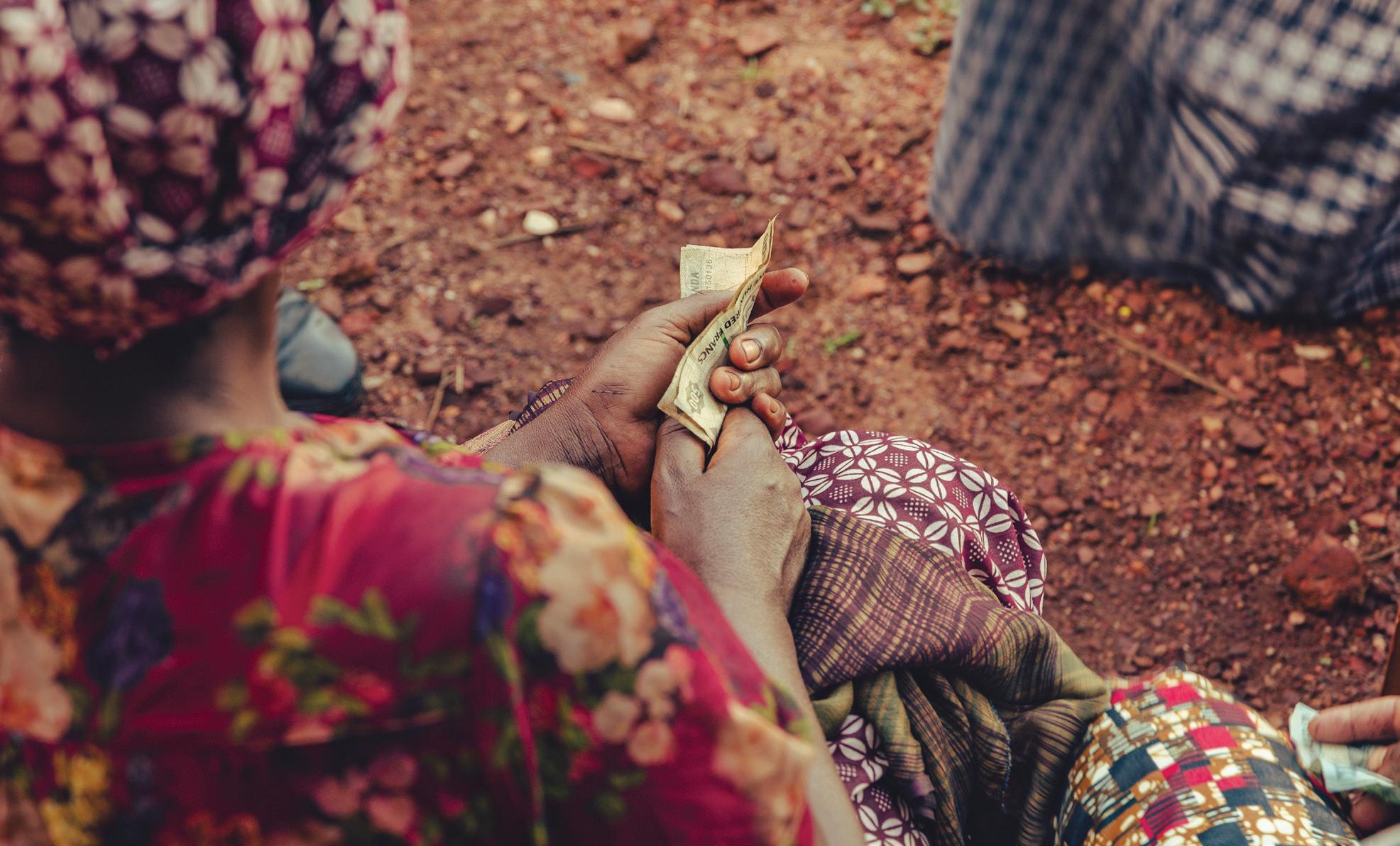
20 2023 Kula Annual Report
In 2024, Kula will…..

ENROLLING 600 FARMERS INTO THE KULA FELLOWSHIP PROGRAM (OUR BIGGEST COHORT YET!)
LAUNCHING OVER 285 NEW BUSINESSES
IMPACTING OVER 1,450 PEOPLE IN RWANDA’S COFFEE COMMUNITIES
EMPOWERING HUNDREDS OF FELLOW HOUSEHOLDS TO MOVE OUT OF EXTREME POVERTY
2023 Kula Annual Report 21
Letter from Our Founder
To our Kula Family,
I was once told that you know you’ve built something when you can hand it off to someone else. It’s with immense pride that I announce I’ve passed off Kula to our incredibly talented and committed team, and my time as a full-time Kula employee has come to end.
Through every high and every low, our mission and work were carried forward by the most committed team led by the most proficient leadership staff. Lindsay, our Director of Impact, started with Kula in 2015 as an unpaid intern. During her interview that lasted all of twenty minutes, I’m fairly sure I asked her two questions – one being, “when can you start?“ – and we’ve been by each other’s side ever since. Fred, our Director of Operations, was our translator when I was in Rwanda, and he’s had multiple roles as we’ve built Kula, growing in and out of each one with a graceful strength. I met Nic, our Executive DIrector, at a conference and told a friend I wanted him to be Kula’s, not realizing a couple years later, he’d be moving to Rwanda to help put all our pieces together to make it something beautiful. Jackie, our Executive Programs Director, came to us as a part-time accountant. We didn’t really need one at the time, but we knew we needed her, and now, none of us can imagine a Kula without Jackie. Our team is our superpower. It’s why our work is working.
Over the years, I’ve had a front row seat to the pursuit of dreams, and because of the nature of our work and our intentionality behind measuring its impact, I’ve also had the privilege of seeing so many realized. I wish I could explain the joy of watching a Kula fellow’s child get to start school and the slightly selfish pride in getting to see one finish it, or women that once struggled to use their voice become the loudest in the room, or men who were once so stuck in inequitable traditions and norms now being taught skills by their wives, or families that lived in high-risk landslide zones build a home somewhere safe. Floors and walls made of unsanitary mud become clean cement. Tired, struggling farms become profitable and sustainable. With every dream that becomes reality, our programs prove their worth. While some happen much more quickly than others, our work is giving people the opportunity to change their lives.
None of this happens without you, our donors and supporters. In this twelve year journey of fundraising, the most surprising thing happened. You became family – family that officiates your elopement, that throws you a wedding reception when you return home. Family that quietly drops wine and food at your door during a time of intense grief. Family that asks you to go with them to a doctor’s appointment no one wants to go to and the family that cries with you in the middle of a crowded restaurant because they want you to know you’re not alone. Family that asks you to stand by them when they get married and others who ask you to speak at their receptions. Family that’s able to separate their love for you from their love for the organization. Family that believes in you even when, especially when, you’re struggling to do so. What an extraordinary and unexpected gift it’s been to be trusted, supported, and loved.
Throughout our years together, I’ve had the privilege of taking many of you to Rwanda, a privilege that allowed me to see this magnificent place through your eyes as you saw it for the first time. You were able to see a place that I’ve come to treasure so dearly, a place the West so often discounts for its past instead of standing in awe at its sheer determination to maintain peace and bring equity to progress. Thank you for investing in that progress and believing in Rwanda’s future.
I’ve written multiple drafts of this letter, asking for more time after each one, because I haven't felt any words I could come up with were deserving of my team and our supporters. I’m not sure I ever will. Starting Kula and getting it to where it is has been the honor of my life, and I’ll take every bit of what I love with me. I’ve taken it to where I can, and now it’s time for me to let Nic, Jackie, and our team carry it forward in ways only they can. My gratitude is unending for what you’ve helped us accomplish, and know that Kula could not be in better hands.
With all my love,
Sarah B. Sasson Founder
22 2023 Kula Annual Report
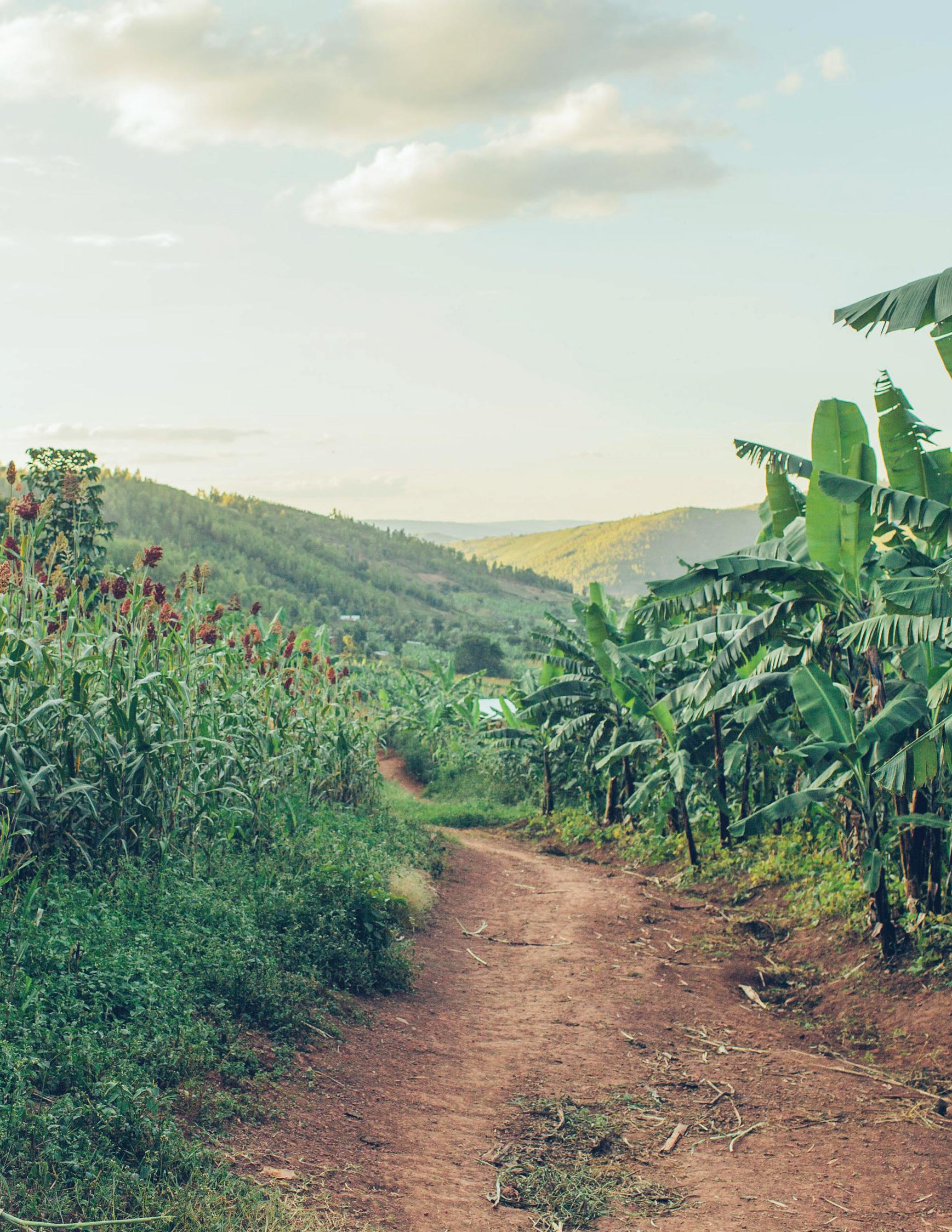
2023 Kula Annual Report 23
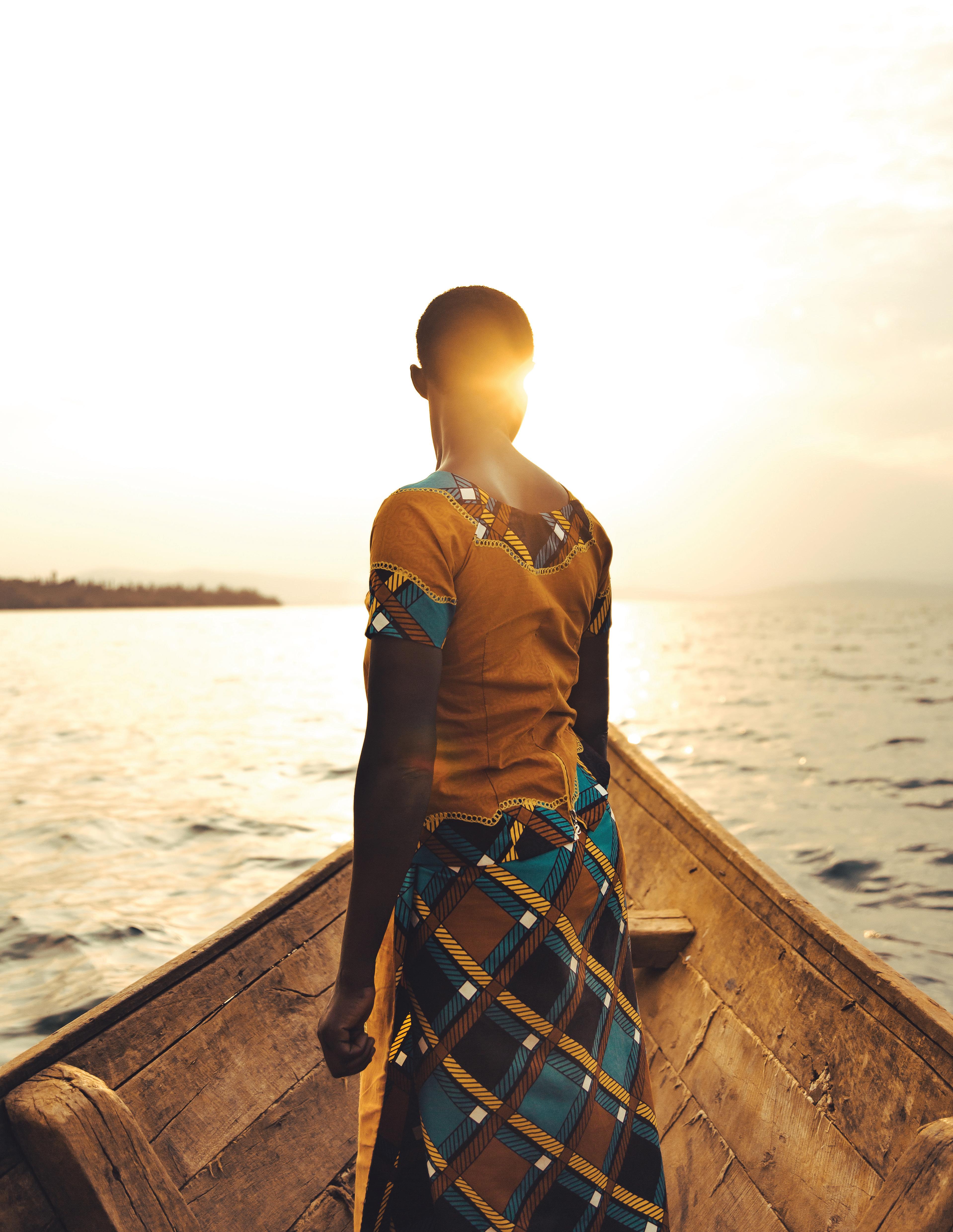
kulaproject.org














 Ntango Washing Station Update
Ntango Washing Station Update




